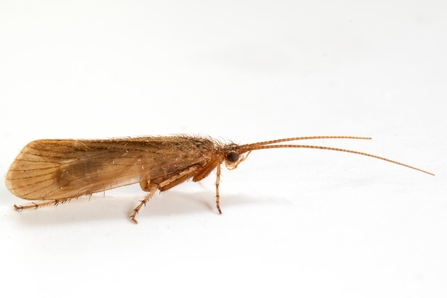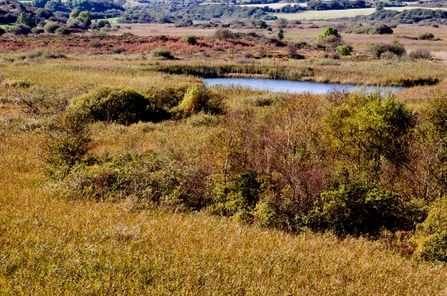
Limnephilus pati (adult) © Robin Sutton

Limnephilus pati (adult) © Robin Sutton
The Limnephilus pati, a species of caddisfly, was found during a recent biodiversity survey. This remarkable find makes Anglesey just one of only three known locations in the UK where the species survives, the others being Market Weston Fen in Suffolk and South Uist in the Outer Hebrides, Scotland.
There are around 200 species of caddisfly in the UK, many of which resemble moths with their hairy wings. The larvae of the species are aquatic and thrive in the dense vegetation of wetland habitats, while the adult insects are active from spring through early August. Most caddis fly larvae make a case to live in – the glue together pieces of plant or sand grains as protection from predators.
Limnephilus pati (larval pupae case) © Ian Wallace
The wetland ecosystem at Cors Goch Nature Reserve is one of the most diverse in Britain; these habitats are increasingly under threat from habitat loss, drying out, and the effects of agricultural intensification, according to Natural Resources Wales.
The discovery was made during survey work by the Natur am Byth partnership, which is focused on saving Wales’ most threatened species.
Chris Wynne, Senior Reserve Manager at the North Wales Wildlife Trust said: “The discovery of this fragile caddis fly highlights the importance of not only protecting areas like Cors Goch but also working to provide new opportunities for wetland species to thrive. For me, it draws attention to the amazing complexity of the natural world and the links between places and species.”
Clare Sampson, Natur am Byth Project Manager added: “It was a delight to find it at Cors Goch, along with a number of other species that indicate clean water and a rich habitat,”
“Discoveries like this prove that there are always exciting finds in nature, and they can be found right on your doorstep”.
Sampson added that the discovery also shows why consistent surveying is "such an important element of conservation work”.
The discovery underscores the importance of continued habitat protection and long-term monitoring to ensure that these rare and vulnerable species are not lost again. It also reinforces the crucial role that nature reserves play in conserving our wildlife — from the most familiar species to those on the brink of extinction.

Cors Goch Nature Reserve © Damian Hughes